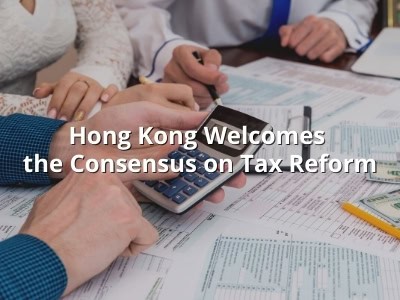Consensus Focuses on the International Tax Reform Framework’s Key Principles

The reform was announced on 1 July by the Organisation for Economic Co-operation & Development. They identified it as the international tax reform (BEPS 2.0). The consensus on tax reform aims to address the risks associated with base erosion and profit sharing (BEPS). The risks have arisen from economic digitalization.
130 jurisdictions globally have indicated that they will accept the BEPS 2.0. This includes Hong Kong as well. Hong Kong is an international commercial and financial center, and it has always been supportive of any international attempts at enhancing tax transparency. Hong Kong supports any effort to combat tax evasion too and adopts the necessary corresponding measures.
BEPS 2.0 will focus on ensuring that there is a fairer distribution when it comes to taxing rights. It will focus particularly on profits acquired by large multinational enterprises (MNEs). The aim will be to set a global minimum tax rate. Small and medium enterprises will not be affected by the BEPS 2.0.
An advisory panel was set up in June last year by the Hong Kong government. The panel will review the possible impact of the package will be and how it will affect Hong Kong’s competitiveness in the business environment. The panel will also make recommendations and appropriate response measures.
The Two-Part Package
The BEPS 2.0 is a two-part package that will focus on the following areas:
- Targeting large MNE groups (this includes digital enterprises that have a 20-billion-euro turnover and more than 10% profitability). It will also focus on distributing tax rights (a portion of profits will go to market jurisdictions).
- Setting a global minimum tax (this will target larger MNE groups that have a global turnover of more than 750 million euros).
Parent or subsidiary companies must pay the top-up tax rate if their jurisdictional tax is below the global minimum tax rate. Details of the BEPS 2.0 are set to be finalized by October. The estimated implementation date is 2023.
The BEPS 2.0 package will be actively implemented in the 2021-22 Hong Kong budget. The aim is to maintain Hong Kong’s tax regime’s key advantages. The advantages include simplicity, fairness, and certainty. The Government will also strive to minimize the compliance burden that affected enterprises must deal with.
Once the package details are finalized, Hong Kong’s advisory panel will submit a report to the Government. The Government will then carefully study the report’s recommendations and discuss specific response measures with key stakeholders.
Take the Stress Out of Your Tax Affairs With 3E Accounting
Hong Kong’s tax system may be simple, but for those unfamiliar with Hong Kong’s local laws and regulations, it can still prove to be a challenge. That is why the team at 3E Accounting is here for you.
For more information on our Hong Kong Taxation Services, visit our website or contact our friendly team today.








